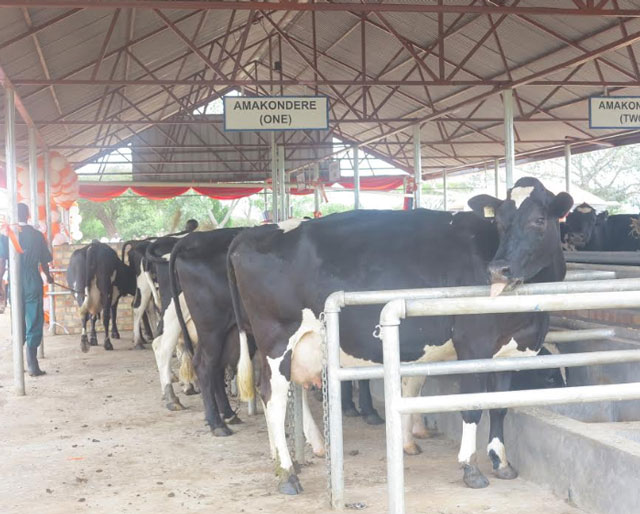
More foreign investment
But the figures show that after years of slump, the economy started rising steadily in FY2017/18 and 2018/19 when it grew by 6.2%.
The bigger economy figures are also good for Foreign Direct investment. If Ugandans are richer, investors know there will be demand for the goods they produce. Investment has been happening already, in cement, steel, cars, and other consumables.
Latest figures supplied by Rinus van Klinken, a Project Manager for the TIDE dairy project implemented by SNV and funded by the Government of The Netherlands in Uganda showed that the export value of dairy products from Uganda has grown from US$5 million in 2013 to US$100 million today, domestic milk sales from 30,000 litres to 150,000 and milk coolers from 250 to 529 today.
Roofings Group produces 400,000 MT of steel products annually, Kakira Sugar 180,000 tonnes per year, and Hima Cement 2.1 million tonnes. With the new figures on the economy, the rate of FDI should go even higher.
Industry is the biggest gainer as it jumps 51% from contributing Shs19 trillion to Nominal GDP in the previously published figures for FY2016/17 to contributing Shs28 trillion in the revised figures for the same year. That should attract even more investment.
The contribution to nominal GDP of agricultural sector which includes forestry and fisheries jumped by 13% from Shs23 trillion to Shs26 trillion. The services sector remains the biggest sector in the economy but it recorded a low jump in the revised contribution to GDP figures; rising Shs43 trillion to Shs47 trillion. The smallest contributor to GDP are taxes on products which also saw the lowest rise in the revised nominal figures of Shs7.3 trillion to Shs7.6 trillion or 4.4%.
More borrowing space
But the bigger economy could lead to a totally different story for Uganda. While addressing the media on Oct.08, President Yoweri Museveni revealed how, because of budget constraints, he had to choose between borrowing to building another hydropower dam and improving the rail network. He could have done both but he did not want to distort the debt/GDP ratio which has a 50% threshold in the Charter for Fiscal Responsibility and the East African Community (EAC) Monetary Union Protocol.
According to Ministry of Finance figures, as of December 2018, debt was at 41.8% of GDP in nominal terms and 31.7% of GDP in present value terms. But that changes now because the GDP is now bigger. It means the ratio of debt is lower, in the 30s possibly.
The improved debt sustainability profile resulting from the lower Debt/GDP ratio also means that the government can borrow on more favourable terms. Suddenly President Museveni could decide to borrow more.
That could spell bad news. It happened when Ghana rebased its economy in 2010 and its economy became bigger by 24%. The government decided it could borrow to finance faster development, especially since it was eyeing oil money. Ghana became an oil producing country in 2010 but the money it hoped for from oil, gold, and cocoa export did not come. The economy has suffered since.
Increased taxation
The Uganda government could choose to approach financing new development differently, through taxation. After all, the government now knows that Ugandans are now richer.
Uganda’s ratio of domestic revenue to GDP was in 2018/19 estimated at 15.2% and 14.6% in the year before. It has been lowest in East Africa as Kenya does 21.92%, Tanzania 15.50% and Rwanda 14.35%. The sub Saharan average rate is 23%. Developed countries are higher; France had 44.6%, Sweden 45.6%, UK 39%, and U.S. 27%.
According to the IMF and World Bank Uganda should have a tax to GDP ratio of at least 23% and the Uganda Revenue Authority (URA) has been pushing towards that target. Now, however, with a bigger GDP, the ratio is going to go even lower. In reaction, URA could impose a slew of raised taxes. This could spell trouble if, as has happened in the past, this burden falls on the already of taxed formal and business sector.
Prof. Augustus Nuwagaba of Makerere University Kampala says the rebasing should help to establish the value of the economy in terms of the constant prices of goods and services.
“Rebasing means that a country is trying to establish a real value of all goods and services for using figures almost similar to what is happening now. This, off course, takes into account of issues like inflation and the current prices,” he says.
“If you don’t rebase, you remain on nominal values – meaning you are valuing the economy based on, for instance, the value of the shilling in the past years,” he says.
 The Independent Uganda: You get the Truth we Pay the Price
The Independent Uganda: You get the Truth we Pay the Price



